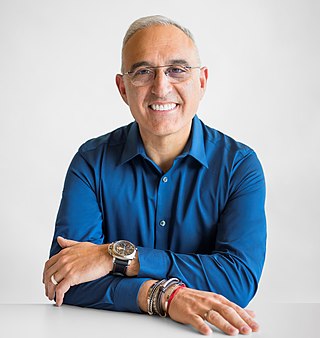Related Research Articles

Itanium is a discontinued family of 64-bit Intel microprocessors that implement the Intel Itanium architecture. The Itanium architecture originated at Hewlett-Packard (HP), and was later jointly developed by HP and Intel. Launched in June 2001, Intel initially marketed the processors for enterprise servers and high-performance computing systems. In the concept phase, engineers said "we could run circles around PowerPC...we could kill the x86." Early predictions were that IA-64 would expand to the lower-end servers, supplanting Xeon, and eventually penetrate into the personal computers, eventually to supplant reduced instruction set computing (RISC) and complex instruction set computing (CISC) architectures for all general-purpose applications.
The Portable Operating System Interface is a family of standards specified by the IEEE Computer Society for maintaining compatibility between operating systems. POSIX defines both the system and user-level application programming interfaces (APIs), along with command line shells and utility interfaces, for software compatibility (portability) with variants of Unix and other operating systems. POSIX is also a trademark of the IEEE. POSIX is intended to be used by both application and system developers.

HP-UX is Hewlett Packard Enterprise's proprietary implementation of the Unix operating system, based on Unix System V and first released in 1984. Current versions support HPE Integrity Servers, based on Intel's Itanium architecture.
Cray Inc., a subsidiary of Hewlett Packard Enterprise, is an American supercomputer manufacturer headquartered in Seattle, Washington. It also manufactures systems for data storage and analytics. Several Cray supercomputer systems are listed in the TOP500, which ranks the most powerful supercomputers in the world.
Open Source Development Labs (OSDL) was a non-profit organization supported by a consortium to promote Linux for enterprise computing. Founded in 2000, OSDL positioned itself as an independent, non-profit lab for developers who are adding enterprise capabilities to Linux. The headquarters was first incorporated in San Francisco but later relocated to Beaverton in Oregon with second facility in Yokohama, Japan.
NonStop is a series of server computers introduced to market in 1976 by Tandem Computers Inc., beginning with the NonStop product line. It was followed by the Tandem Integrity NonStop line of lock-step fault-tolerant computers, now defunct. The original NonStop product line is currently offered by Hewlett Packard Enterprise since Hewlett-Packard Company's split in 2015. Because NonStop systems are based on an integrated hardware/software stack, Tandem and later HPE also developed the NonStop OS operating system for them.

David A. Bader is a Distinguished Professor and Director of the Institute for Data Science at the New Jersey Institute of Technology. Previously, he served as the Chair of the Georgia Institute of Technology School of Computational Science & Engineering, where he was also a founding professor, and the executive director of High-Performance Computing at the Georgia Tech College of Computing. In 2007, he was named the first director of the Sony Toshiba IBM Center of Competence for the Cell Processor at Georgia Tech.

SUSE S.A. is a Luxembourgish multinational open-source software company that develops and sells Linux products to business customers. Founded in 1992, it was the first company to market Linux for enterprise. It is the developer of SUSE Linux Enterprise and the primary sponsor of the community-supported openSUSE Linux distribution project. While the openSUSE "Tumbleweed" variation is an upstream distribution for both the "Leap" variation and SUSE Linux Enterprise distribution, its branded "Leap" variation is part of a direct upgrade path to the enterprise version, which effectively makes openSUSE Leap a non-commercial version of its enterprise product.

HP Labs is the exploratory and advanced research group for HP Inc. HP Labs' headquarters is in Palo Alto, California and the group has research and development facilities in Bristol, UK. The development of programmable desktop calculators, inkjet printing, and 3D graphics are credited to HP Labs researchers.
The Machine is the name of an experimental computer made by Hewlett Packard Enterprise. It was created as part of a research project to develop a new type of computer architecture for servers. The design focused on a “memory centric computing” architecture, where NVRAM replaced traditional DRAM and disks in the memory hierarchy. The NVRAM was byte addressable and could be accessed from any CPU via a photonic interconnect. The aim of the project was to build and evaluate this new design.

Bulusu Lakshmana Deekshatulu is an Indian academic who has made important contributions to Digital Image Processing and Control Theory. He is a Fellow of The World Academy of Sciences, Fellow of Indian National Science Academy, The National Academy of Sciences, India, Indian Academy of Sciences, Indian National Academy of Engineering, National Academy of Agricultural Sciences, and IEEE.

The Hewlett Packard Enterprise Company (HPE) is an American multinational information technology company based in Spring, Texas.
Joel Samuel Birnbaum is a technology executive who served as senior vice president of Hewlett-Packard.
Hewlett Packard Labs is the exploratory and advanced research group for Hewlett Packard Enterprise and its businesses. It was formed in November, 2015 when HP Labs spun off Hewlett Packard Labs to reflect the spin off of Hewlett Packard Enterprise from HP Inc.. The lab is located in Palo Alto, California.

Vaidyeswaran Rajaraman is an Indian engineer, academic and writer, known for his pioneering efforts in the field of Computer Science Education in India. He is credited with the establishment of the first academic program in computer science in India, which he helped initiate at the Indian Institute of Technology, Kanpur in 1965. An elected fellow of all the Indian science academies, he is a recipient of Shanti Swarup Bhatnagar Prize, the highest Indian award in Science and Technology category for young scientists and several other honors including Om Prakash Bhasin Award and Homi Bhabha Prize. The Government of India awarded him the third highest civilian honor of the Padma Bhushan, in 1998, for his contributions to science.
Puneet Sharma is a Distinguished Technologist from the Hewlett Packard Laboratories, Palo Alto, CA where he heads the Networked Systems group. He started his research career as Research Scientist at HP Labs in September 1998.
Kimberly Kristine Keeton is an American computer scientist specializing in databases and computer data storage. She worked at HP Labs as a Distinguished Technologist and is currently employed by Google as Principal Engineer, and was one of the designers of the Express Query metadata database used by Hewlett-Packard as part of their StoreAll large-scale data storage systems.

Antonio Neri is an Argentine-Italian-American businessman who currently serves as president and chief executive officer (CEO) of Hewlett Packard Enterprise (HPE). Born in Argentina, he studied engineering at National Technological University and started working for Hewlett-Packard in 1995. Neri joined HPE's board of directors upon his promotion to the president and CEO position in 2018.

LUMI is a petascale supercomputer located at the CSC data center in Kajaani, Finland. As of January 2023, the computer is the fastest supercomputer in Europe.
Sandra Kay Johnson is a Japanese-born American electrical engineer, the first African-American woman to earn a doctorate in electrical engineering at Rice University, and the first black woman in the IBM Academy of Technology.
References
- 1 2 3 4 5 Labs’ Newest Fellow Tests the Boundaries of Linux and Trustworthy AI, Hewlett Packard Enterprise, January 25, 2023, retrieved 2023-07-15
- 1 2 3 4 Suparna Bhattacharya, Eminent Speaker, ACM India, retrieved 2023-07-15
- 1 2 3 "IEEE-iSES 2021 Women in Engineering", IEEE ISES (Panelist biography), IEEE, 2021, retrieved 2023-07-15
- ↑ "WIT Decade 2000", IBM Women in technology, IBM, retrieved 2023-07-15
- ↑ IEEE Fellows directory, IEEE, retrieved 2023-07-15